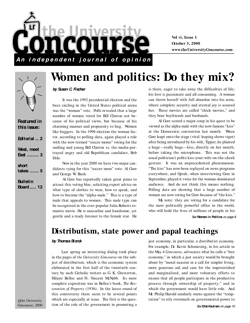Reconsidering the term ‘Baptism in the Holy Spirit’
by Scott Johnston
I have a bone to pick with the term “baptism in the Holy Spirit,” which has been used in Concourse discussions about the charismatic renewal, most notably by Ralph Sharafinski. I think Catholics should find another term, for this one is confusing and not an accurate representation of the phenomena as explained. Catholic theology, in order to be somewhat coherent as time goes on, has long been extremely solicitous for precision in with language. Much of the 400-plus year debate over fundamental Christological issues in the early Church was over terminology. Even when the same underlying theologically orthodox position’s were held, bishop’s would engage in very heated arguments over precise terminology.
Once the Church has hammered out the particular meanings of certain theological terms used in official doctrinal expressions of the faith, they have become part of what can truly be said to be a Catholic vocabulary. To be a Catholic theologian at a later time must include embracing this theological patrimony. For the sake of clarity (keeping in mind the universality of the Church and the extremely diverse origins of her theologians around the world), the Church’s terminology must be guarded and efforts need to be made to preserve the correct understanding of the terms she uses in her official doctrines. (Consider for example the possible consequences of changing just one word in the Apostles Creed.)
The terms “Theotokos,” “person,” “nature,” and “eternally begotten” have precise, technical meanings in Church doctrine, which, if taken to mean something other than what the Church understands them to mean, can turn an orthodox statement of the faith, into heresy. In fact this is a method used commonly by dissenting or otherwise heterodox Catholic theologians to spread confusion and doubt while maintaining a surface appearance of orthodoxy. “Transubstantiation” for example is inauspiciously redefined by an author in an early part of a text. Then it is used ambiguously throughout the work in such a way as to give the appearance of faithfulness to Church teaching, when in reality it is being undermined.
This kind of coherent, Catholic universal theological vocabulary, does not exist in Protestant theology. Only among small subgroups is there a decent degree of theological consistency. Hence my concern. (I hope you don’t mind my saying that sometimes cradle Catholics have too poor a sense of just how precious and wide ranging the blessed unity within Catholicism (including theological terminology) truly is. To step outside the Church in the world of theology is to enter into a confused morass that in many respects is stuck in disputes the Church solved—by magisterial authority—in the first millennium of her existence.)
“Baptism in the Holy Spirit,” to my understanding (correct me if I am wrong) is thoroughly non-Catholic in its origins. This is a problem. “Baptism,” being one of the seven sacraments, has a well defined meaning in Catholic theology, reaching far back in the tradition. In fact the meaning of this term underlies one of the very few instances where the Church has authoritatively defined the specific meaning of a Biblical passage. It seems to me that the Catholic meaning of “Baptism” and the Protestant originated “Baptism in the Holy Spirit” are simply not reconcilable (they have a somewhat analogous relationship at best, but this is not sufficient). I am not saying that the underlying meaning of “Baptism in the Holy Spirit” has no application to Catholic religious experience or theology. I am saying that a different term needs to be used if it is ever to add clarity rather than confusion to theological discourse, since “Baptism” is clearly a long standing term on its own having been well established in its meaning in the Catholic vocabulary for centuries.
We are not doing well for the Church when we let slide ambiguities in terminology, which are in part responsible for the lack of unity outside the Catholic Church. Only Catholicism is capable of even attempting to establish a standard theological vocabulary—for anything resembling the doctrinal unity of the Church (resting upon the magisterium and the rock of Peter) does not exist outside the Bark of Peter.
Scott Johnston
Scott Johnston is a senior at FUS, majoring in Philosophy and Biology. A convert to Catholicism, he is a member of the pre-theologate program,and hopes to serve the Church as a priest. He is a Contributing Editor of the Concourse.


